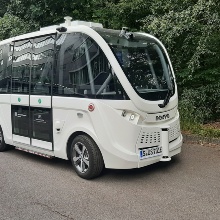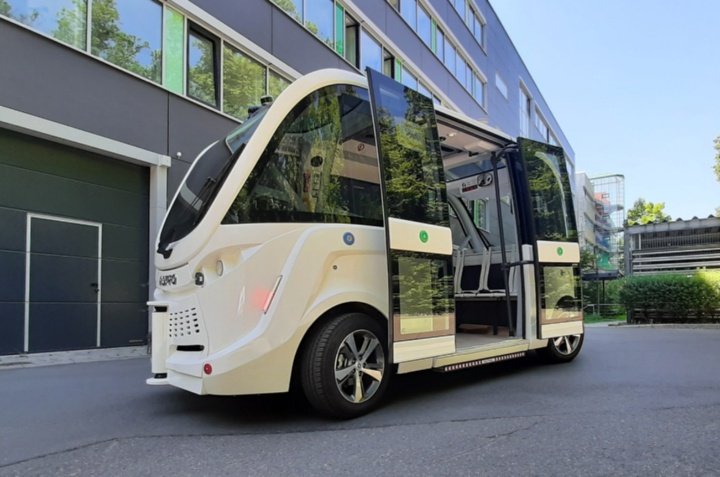The white CampusShuttle is part of the MobiLab Real-World Laboratory and will one day transport University of Stuttgart employees and students around the campus. But until that happens, the vehicle still has a lot to learn. As part of Mobility Week, Dr. Dan Greiner and his colleagues from the Institute of Automotive Engineering Stuttgart (IFS) at the University of Stuttgart will be presenting the CampusShuttle on Friday September 16, 2022 from 2 p.m. in Stuttgart's Vaihingen district. A panel discussion will be held at 4:30 p.m., where future vehicle and mobility concepts will be discussed.
Before the CampusShuttle is able to drive on its own, the researchers first have to program it with the route on campus. "The vehicle has to learn where the stops are, where curves are, and the areas where oncoming traffic might be an issue. It's a time-consuming and arduous process," says Greiner. The planned route on Campus Vaihingen will lead from the IFS at Pfaffenwaldring 12, first to ARENA2036, then past the Keltenschanze sports hall and finally between Pfaffenwaldring 9 and 47 to the "Universität" S-Bahn stop. The route deliberately includes some scenarios that are currently difficult for automated vehicles to handle. In this way, the scientists aim to generate a comprehensive picture of the capabilities and further development potential of this technology. The vehicle cannot leave the programmed route on its own.
Stuttgart's first autonomous vehicle
If the TÜV (technical inspection agency) positively assesses the vehicle on the route and if the Stuttgart Regional Council grants approval, the driverless shuttle is scheduled to begin operating on the Vaihingen campus in spring 2023. This would make it the first autonomous vehicle to drive on public roads in Stuttgart. Its top speed will be around 20 kilometers per hour, and it will have seating for eight people. A so-called safety driver is also planned, who would accompany the shuttle on its journey and intervene of necessary. The current shuttle is equipped with a conventional battery. For the future, it is planned that the vehicles will be able to charge inductively on the road whilst on the move. "Inductive charging has the advantage that a heavy batter is no longer required, and it doesn't need to be charged while stationary, so it's always ready for use."
The CampusShuttle belongs to the MobiLab Real-World Laboratory
The CampusShuttle is a subproject organized by the MobiLab Real-World Laboratory, which focuses on the development of a car-free campus. The project will include the construction of parking garages on the edge of the Vaihingen campus. From there or from the S-Bahn station, the CampusShuttle would then be able to take students and employees to their place of study or work. In addition to the self-driving shuttle, a team led by Professor Frank Allgöwer is also developing an autonomous e-scooter, which is also part of the University of Stuttgart's pioneering mobility concept. As part of the MobiLab project, a team led by Professor Nejila Parspour and Professor Krzysztof Rudion is researching and experimenting on the topic of inductively charging vehicles while driving.
How should the CampusShuttle be called?
In mid-September 2022, we called on you to send us name suggestions. Thank you for your great participation. You can find out what name the MobiLab team decided on in the article about the new name of the CampusShuttle [DE].
| Contact | Manfred Wacker, Institute for Road and Transport Science, University of Stuttgart, email, phone: 0049 711 685 82481 |
|---|



